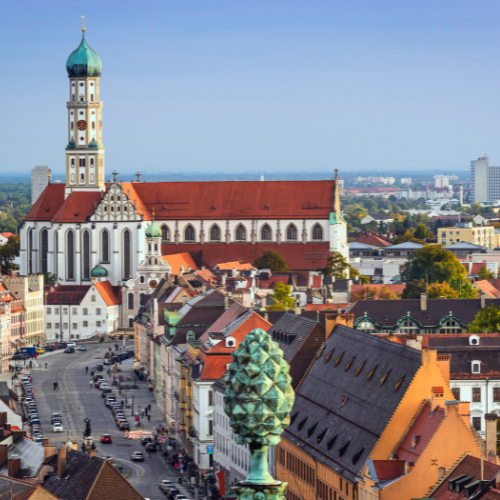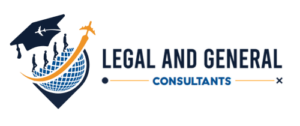STUDY IN GERMANY
OVERVIEW OF GERMANY
Germany, a heartland of Europe, is renowned for its rich history, robust economy, and high standard of living. Cradled between the North and Baltic Seas in the north, and the Alps in the south, Germany boasts a diverse geography, from coastal plains to mountainous regions. Its culture is a harmonious blend of tradition and modernity, exemplified by its love for classical music, literature, and philosophy. As a global economic powerhouse, Germany is a hub of innovation and technology, with industries like automotive, engineering, and renewable energy at the forefront. The German language, known for its precision and complexity, is widely spoken across the country.
Climate:
Germany’s climate is predominantly temperate, offering a balance of mild winters and warm summers. While the western regions enjoy a maritime climate with frequent rainfall due to the North Sea’s influence, the eastern parts lean towards a continental climate with colder winters and hotter summers. Overall, the country experiences abundant rainfall throughout the year. However, the impact of climate change is evident with rising temperatures, more frequent heatwaves, and altered precipitation patterns.
Study in Germany
Culture and Lifestyle in Germany:
Germany is a blend of tradition and modernity, renowned for its efficiency, order, and a strong work ethic. This culture is deeply rooted in history, philosophy, and a respect for rules. Punctuality is highly valued, reflecting in the country’s efficient transportation systems. Germans tend to be direct communicators, prioritizing honesty and clarity. Despite their reputation for seriousness, Germans have a vibrant social life. Oktoberfest is a global symbol of German revelry, but there are countless other festivals and events throughout the year. Family and community are central to German life, with a strong emphasis on quality time and shared experiences.
German cuisine is hearty, with a focus on fresh ingredients. Bread, sausages, and beer are staples. The country also boasts a rich intellectual life, producing world-renowned philosophers, musicians, and artists. Modern Germany is a dynamic place, blending traditional values with a forward-thinking approach to technology and sustainability.
Germany as a Study Destination:
Germany stands out as an exceptional study destination due to its world-class universities offering affordable or almost free and high-quality education. Students are drawn to its diverse programs, strong economy promising ample job opportunities, and exceptional living standards. While language proficiency is essential for most programs and the application process can be intricate, the rich cultural experiences and opportunities for personal growth make Germany a compelling choice for international students seeking a fulfilling academic journey.
Key Advantages of Studying in Germany:
- Affordable Education: Unlike many other countries, most public universities in Germany do not charge tuition fees.
- High-Quality Education: German universities consistently rank among the best globally, offering rigorous academic programs.
- Diverse Programs: From engineering and technology to humanities and arts, Germany offers a wide range of study options.
- Strong Economy: Germany’s robust economy provides ample job opportunities for graduates, both within the country and abroad.
- Excellent Living Standards: Germany offers a high quality of life, with efficient infrastructure, safe cities, and a good work-life balance.
- Cultural Richness: Experience German history, art, music, and philosophy firsthand, while also interacting with a diverse student population.

Challenges and Considerations:
- Language Barrier: Proficiency in German is often required for many programs, although English-taught courses are increasing.
- Competition: Admission to popular programs can be competitive, especially at top universities.
- Bureaucracy: The application and visa process can be complex and time-consuming.
Choose a Public or a Private University in Germany?
If you’re stuck between choosing a public or a private university, it’s good to know that both offer you excellent education.
- Public universities have a strong reputation and receive more government funding which makes the tuition fee almost zero.
- Private universities also have their benefits. They have easier admission processes, modern facilities, and exchange programs. The choice needs to match your preferences, career goals, and budget. This also involves tuition fees.
Features | Public Universities | Private Universities |
Tuition Fees | Low to no tuition fees for most programs. For example, the University of Munich (LMU) and the University of Cologne. | Tuition fees are higher. For example, Otto Beisheim School of Management and GISMA Business School. |
Programs | Many programs with traditional or research-oriented degrees. | Specialized programs focusing on specific fields. For example, business, arts, or management. |
Class Size | Larger class sizes. | Smaller class sizes, more interactions with students and colleagues. |
Language of Instruction | Mainly German, some in English | Many programs in English |
Research | Extensive funding and strong focus on research. | More practical, but research opportunities still exist in selected areas. |
Admission Requirements | Very competitive. | Less competitive. |
Scholarships | Limited scholarships for international students, many funding options for research. | More scholarships for international students. |
Reputation and Rankings | Public universities have strong international rankings. | Also have good rankings in their specialized fields. |
Campus Facilities | Many facilities, for example, extensive research, libraries, laboratories. | Modern campuses with latest facilities for the specialized course of your choice. |
Employability | A strong reputation, extensive research, large alumni networks, enhance employability. | Specialized programs, English-language instruction, industry connections, and practical experience lead to better employability, especially in specific sectors. |
The Education System in Germany:
Germany’s higher education system is divided into three main types of institutions: Universities, Universities of Applied Sciences (Fachhochschulen), and Technical Universities. Universities primarily focus on theoretical knowledge and research, while Universities of Applied Sciences emphasize practical application and industry relevance. Technical Universities specialize in engineering, technology, and natural sciences. The German education system has aligned itself with the Bologna Process, adopting the Bachelor’s, Master’s, and PhD degree structure, making it easier for international students to transfer credits and pursue further studies.
Feature | Description |
Types of Institutions | Universities (theoretical focus), Universities of Applied Sciences (practical focus), Technical Universities (engineering and technology focus).
|
Degree Structure | Bachelor’s (3-4 years), Master’s (1-2 years), PhD (3-5 years) – follows the Bologna Process. |
Academic Year:
Germany operates on a two-semester system. The winter semester typically commences in October and concludes in March, while the summer semester spans from April to September. It’s essential to note that these are general guidelines as specific dates can vary between universities. Within each semester, there are lecture periods, examination periods, and shorter breaks. While this structure provides a foundational understanding, it’s crucial to consult the specific academic calendar of the desired university for accurate and detailed information.
Germany intakes | Programs | Tentative admission deadlines |
Summer Semester | Undergraduate and Postgraduate |
Typically runs from April to September. |
Winter Semester: | Undergraduate and Postgraduate | Typically runs from October to March. |
Teaching and Leaning Style:
As well as German Universities being devoted to research and high-quality teaching, they also aim to provide opportunities that improve students’ learning, career and life. Classes at university are a combination of lectures and tutorials. Lectures are taught by professors and can be held anywhere between 30 to 200 students. They usually have a linked component such as a lab or a tutorial. A tutorial or lab allows a more in-depth discussion of topics within a course. The sizes of tutorials generally range anywhere from 20 to 30 students.
Scholarships:
A significant advantage of studying in Germany is the often low or nonexistent tuition fees at public universities. However, living expenses, including accommodation, food, transportation, and health insurance, need to be considered.

The German Academic Exchange Service (DAAD) offers various scholarships to international students, covering tuition fees, living expenses, and travel costs. https://www.daad.de/en/ all details are mentioned as follows in the link.
S. No. | Feature | Description |
1 | Tuition Fees | Public universities: Low or free. Private universities: Varying costs. |
2 | Living Expenses | Estimated at €800-€1000 per month. |
3
| Scholarships | DAAD scholarships and other funding opportunities are available. https://www.daad.de/en/ all details are mentioned as follows in the link. |
Most Popular Subjects for International Students in Germany:
The Germany reigns supreme as the world’s most popular study abroad destination thanks to its top-ranked institutions and unbeatable variety of majors. However, programs in the following subjects are especially popular:
Rank | Subject | Description |
1 | Engineering | Germany’s reputation as an engineering powerhouse attracts students worldwide, with specializations in mechanical, electrical, automotive, and civil engineering. |
2 | Business and Management | The country’s thriving economy offers ample opportunities in business and management, with programs covering areas like finance, marketing, and international business. |
3 | Computer Sciences & IT | Germany’s tech industry is booming, making computer science and IT highly popular choices for international students. |
4 | Natural Sciences | Fields like biology, chemistry, and physics are well-regarded in Germany, with strong research institutions and laboratories. |
5 | Medicine | Germany’s advanced healthcare system and renowned medical schools draw aspiring doctors from around the globe. |
University Application Process in Germany:
Applying to a German university generally involves the following steps:
- Research programs: Identify desired courses and universities.
- Language proficiency: Meet German language requirements (TestDaF, DSH) or English language requirements (for English-taught programs).
- Admission requirements: Fulfill specific subject-related requirements.
- Application through Uni-assist: Most international students apply through Uni-assist, a central application service.
- Visa application: Obtain a student visa after acceptance.

International students require a student visa to study in Germany. The visa application process involves providing proof of acceptance to a university, financial resources, and health insurance. The German Embassy or Consulate in your home country handles visa applications. However, here is a list of common documents that are typically required:

- A secondary school diploma or equivalent.
- Proof of proficiency in the language of instruction (German or English).
- Submit the university’s application form by deadline.
- Academic transcripts and certificates.
- A resume with your educational background and achievements.
- Write a statement explaining your program choice and career goals.
- Some programs ask for recommendation letters.
- Attend an interview (if required).
- Take entrance exams (if required).
- Pay the application fee.
- Match the visa and residence permit requirements.
- Prove you have money to cover tuition and living expenses.
Admission tests to study bachelor’s degree in Germany:
While specific requirements can vary depending on the university and chosen program, here are the common admission tests for international students seeking a bachelor’s degree in Germany:
- Language Proficiency Tests:
- TestDaF (Test für Deutsch als Fremdsprache): This is the most common German language proficiency test required for university admission.
- DSH (Deutsche Sprachprüfung für den Hochschulzugang): Similar to TestDaF, but often required by specific universities.
- Aptitude Test
- TestAS: This test assesses general and subject-related aptitude for university studies. It’s often required or recommended by universities.
- Foundation Course Exam (Feststellungsprüfung)
- If your previous qualifications are not recognized, you might need to attend a preparatory course (Studienkolleg) and pass the Feststellungsprüfung to gain university admission.
Top Universities in Germany Public Private Mix:
Top 10 Universities in Germany | QS World Rankings 2024 | Universities |
1 | 37 | Technical University of Munich |
2 | 54 | Ludwig Maximilian University of Munich |
3 | 87 | University of Heidelberg |
4 | 98 | Free University of Berlin |
5 | 106 | RWTH Aachen University |
6 | 119 | Karlsruhe Institute of Technology (KIT) |
7 | 126 | Humboldt University of Berlin |
8 | 147 | Technical University of Berlin |
9 | 191 | University of Hamburg |
10 | 212 | University of Freiburg |
Student Visa Application Process:
Obtaining a student visa to study in Germany involves several steps:
- Gain Admission to a German University: Secure a place at a recognized German university.
- Gather Required Documents: Prepare all necessary paperwork, including your passport, acceptance letter, proof of financial means, health insurance, and language proficiency certificates.
- Schedule an Appointment: Book an appointment at the nearest German embassy or consulate in your home country.
- Attend Visa Interview: Attend the visa interview and provide any additional information or documents requested by the consular officer.
- Pay Visa Fee: Submit the visa fee as required.
- Await Decision: The visa processing time can vary, so it’s essential to apply well in advance of your intended study start date.
Key Documents:
- Valid passport
- Acceptance letter from a German university
- Proof of sufficient financial means (usually around €10,236 per year)
- Health insurance certificate
- Language proficiency certificate (TestDaF, DSH, or equivalent)
- Two recent passport-sized photos
- Completed visa application form
Career Opportunities After Graduation:
Germany boasts a robust job market with significant opportunities across various sectors. Here is an in-depth look at career prospects for graduates:
- Engineering:
Career Opportunities: Automotive, aerospace, mechanical, electrical, civil, and chemical engineering are in high demand. Engineers work in research and development, production, quality control, and consulting.
Salary Range: Starting salaries for engineers typically range from €40,000 to €55,000 per year, with experienced engineers earning upwards of €80,000 or more. - Business and Management:
Career Opportunities: Roles span across various industries including finance, marketing, consulting, human resources, and entrepreneurship. Graduates can work in corporations, startups, or government agencies.
Salary Range: Starting salaries usually range from €35,000 to €45,000 per year, with potential for significant growth in managerial positions. - Computer Sciences & IT:
Career Opportunities: High demand for software developers, IT consultants, cybersecurity experts, and data analysts. Opportunities exist in tech companies, startups, and various industries.
Salary Range: Starting salaries can range from €40,000 to €50,000 per year, with experienced professionals earning significantly more. - Natural Sciences:
Career Opportunities: Diverse roles in research, academia, industry, and government. Fields include biology, chemistry, physics, and environmental science.
Salary Range: Starting salaries vary based on the specific field. Generally, expect a range of €35,000 to €45,000 per year, with potential for higher earnings in specialized roles. - Medicine:
Career Opportunities: Physicians, surgeons, researchers, and healthcare administrators are among the career paths. Strong job security and high earning potential.
Salary Range: Medical professionals in Germany enjoy high salaries, with starting salaries often exceeding €60,000 per year.
Part-Time Work Opportunities:
International students are generally allowed to work part-time for up to 20 hours per week during the semester and full-time during university breaks. Part-time jobs can help cover living expenses and provide valuable work experience.
Feature | Description |
Regulations | International students allowed to work 20 hours per week during semester and full-time during breaks. |
Job types | Various student jobs available in hospitality, retail, and other sectors. |

Post-Study Work Rights:
After graduation, international students can apply for an 18-month residence permit to find a job related to their field of study. Once employed, they can apply for a residence permit or an EU Blue Card for long-term residency. Germany offers a favorable pathway to permanent residency for international graduates, especially in high-demand sectors.
Popular Cities to Study in Germany:
Germany boasts several cities known for their excellent educational institutions and vibrant student life. Some of the most popular cities for international students include:
- Berlin: Germany’s capital, known for its diverse culture, history, and innovative tech scene. Home to Humboldt University and Technical University of Berlin.
- Munich: A hub for engineering and business studies, with institutions like Technical University of Munich. Offers a high quality of life and beautiful surroundings.
- Heidelberg: Known for its picturesque setting and prestigious university, one of the oldest in Germany.
- Frankfurt: A major financial center, home to Frankfurt School of Finance & Management and Goethe University.
- Hamburg: A port city with a strong maritime industry, offering programs at the University of Hamburg and Hamburg University of Technology.
Study and Living Expenses in Germany:
The cost of studying and living in Germany varies by city and lifestyle. Here’s a breakdown of typical expenses:
- Tuition Fees:
- Public Universities: Typically, low or no tuition fees, with some administrative fees (EUR 100 – EUR 350 per semester).
- Private Universities: EUR 10,000 – EUR 20,000 per year.
- Accommodation:
- On-Campus (Student Residences): EUR 300 – EUR 500 per month.
- Off-Campus (Private Rentals): EUR 400 – EUR 800 per month (depending on the city and type of accommodation).
- Living Expenses:
- Food: EUR 150 – EUR 250 per month.
- Transportation: EUR 50 – EUR 100 per month (public transit, often discounted for students).
- Health Insurance: EUR 80 – EUR 160 per month (mandatory for all students).
- Miscellaneous: EUR 100 – EUR 200 per month (entertainment, personal expenses).
Total Estimated Cost:
EUR 800 – EUR 1,200 per month for living expenses, in addition to any tuition fees.
The cost of student visa in Germany:
The cost of a student visa for Germany is typically around EUR 75. This fee may vary slightly depending on the applicant’s nationality and the specific embassy or consulate handling the application. Additionally, international students are often required to open a blocked account with a deposit of approximately EUR 10,332, which serves as proof of financial resources to cover living expenses during their stay in Germany.
all details are mentioned at the official website of immigration @ Germany
German Embassy in Pakistan:
- Description: Embassy of the Federal Republic of Germany
- Head: Alfred Grannas, Ambassador
- City/Town: Islamabad
- Country: Pakistan
- Address: Ramna 5, Diplomatic Enclave, Islamabad
- Postal address: Embassy of the Federal Republic of Germany, P.O. Box 1027, Islamabad, Pakistan.
- Administrative / consular district: Punjab, Khyber-Pakhtunkhwa, FATA (Federally Administered Tribal Areas), Gilgit-Baltistan, AJK (Azad Jammu and Kashmir).
- Departments: Visa:
Tel: +92 51 227 9430 – 35
Monday – Thursday from 14:00 – 16:00 hrs.
No inquiries regarding the status of a specific visa application, please!
Preferably contactus per Email
Appointments for attestations, visa and passport applications at the German Embassy can only be made online. We ask for your understanding that appointment requests by phone or e-mail will remain unanswered.
Opening hour
Between 01 May and 30 September:
Monday – Wednesday | 08:00 – 13:00 | 13:30 – 15:00 |
Thursday | 08:00 – 13:00 | 13:30 – 16:00 |
Friday | 08:00 – 13:30 |
Between 01 October and 30 April:
Monday – Thursday | 08:00 – 13:00 | 13:30 – 16:30 |
Friday | 08:00 – 13:30 |
- Contact: Email contact / Telephone +92 51 2007 – 200 (except visa enquiries) Emergency number outside opening hours +92 334 05 80 589 (for emergencies of German nationals only) from Germany CEST +3 hours (+4 rest of the year
- Fax: +92 51 227 94 36
- Website: http://www.pakistan.diplo.de For emergency cases involving German nationals in Pakistan (and strictly under no circumstances in visa matters) you may contact the duty officer under one of the following numbers via phone (SMS also availably): +92-334-05 80 589
Visa matters are not considered emergencies.

